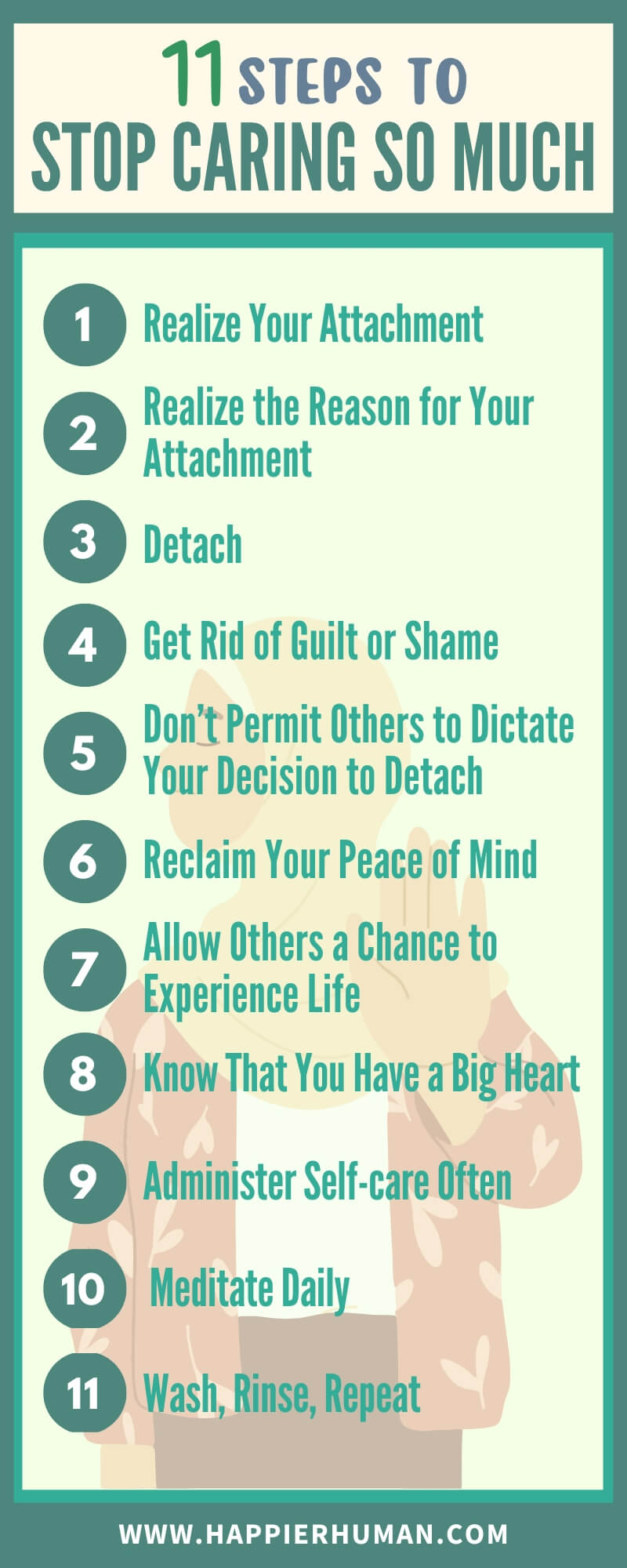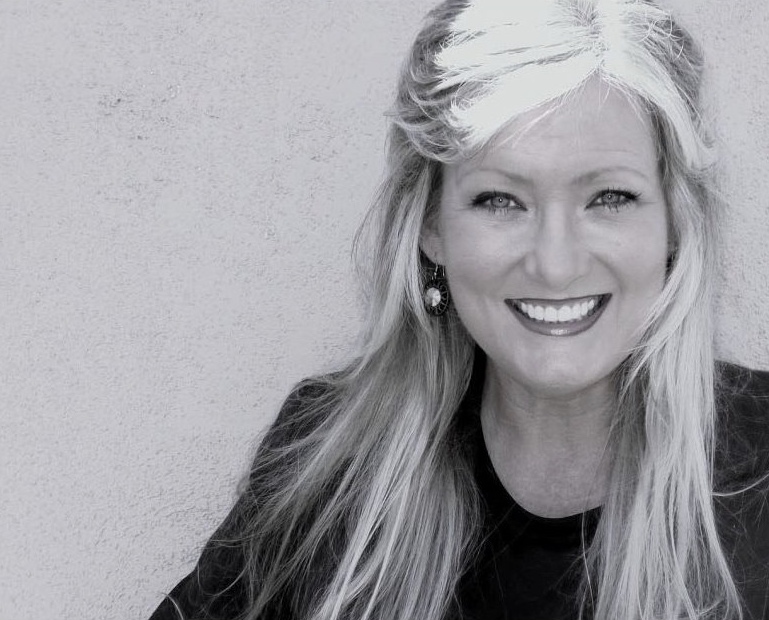It’s the last straw. You’ve been hurt again by trying to help someone else. You can’t take it anymore and don’t know what to do. Things have turned toxic, and you need to break free.
It’s okay. Relax. In this article, you will learn how to stop caring so much.
Let’s get to it.
Why Should I Stop Caring?
There are instances when you should stop caring because, for one thing, it may make you sick. Anxiety, depression, physical illness, and a weakened immune system arise from high cortisol levels released from the brain into the body.
This occurs when you stress out. If not managed, high cortisol levels may cause serious health issues like cancer, heart disease, major organ problems, high blood pressure, and stroke.
The other reason you should stop caring is that you are not helping the other person in the long run. You can’t control another person’s life or their choices. It’s enough to live your own life without trying to live someone else’s too.
Why do you think you can control two lives? You have a big heart, and you care. You want to help. You have love at your core, and it’s difficult to accept that you need to back away.
To help you understand why you might need to, let’s look at 11 steps to stop caring so much.
11 Steps to Stop Caring So Much
1. Realize Your Attachment
You are reading this article because you were guided to this page. You may want to learn how to stop caring so much.
Most people realize they have a negative attachment when it has pushed them too far. Maybe it was an argument or violent rage that opened their eyes. Perhaps they realized that they had been lied to, cheated on, or used. Did this happen to you?

Step back and evaluate what is happening. Is there a dilemma? Identify it.
Examine the problem the attachment is causing. Toxicity? Health issues? Mental difficulties? Relationship disputes?
Certain connections can complicate things because we feel that we have a social and moral responsibility to be forever chained to people, toxic or not. These are some types of relationships that may become your ball and chain:
Discovering your attachment is only the first part. If you want to know how to stop caring so much, you must uncover the reason it exists.
2. Realize the Reason for Your Attachment
Most likely, you will have to dig deep down to examine the reason for your attachment. It may be embedded in your job, an obligation or responsibility, family expectations, or even the need to save someone.
There is a road to awareness, but it takes introspection and self-reflection. These are questions to ask yourself:
Another element to face while seeking awareness is to realize the reason why you care so much. Here are a few causes:
Perceiving and understanding the reason you have the attachment in the first place will teach you about yourself. You will discern why you suffered the attachment and how to begin and hold fast to the process of detaching.
3. Detach
Disconnecting from carrying others’ pain is difficult. However, their turmoil will become yours unless you disengage. You must realize that all suffering is caused by attachments.
Here are some ways to free yourself to stop caring so much:
Once you’ve gotten this far, you’re going to experience some off-putting emotions. They will be directed at you from other people and from within yourself. You will most likely doubt your decision and feel waves of guilt and shame.
4. Get Rid of Guilt or Shame
Guilt can either be a sense of responsibility dumped on us by others, or it can be a sense of remorse that we feel deep inside.
Shame can either be a moral punishment that others want us to suffer, or it can be an excruciating feeling of having done something wrong.
Guilt and shame have two sources: others and you. We often understand that other people cause our guilt and shame, but we don’t usually pick up on the fact that we can put these negative energies onto ourselves. There is only a slight difference between who pulls out those guns, but the lasting effect can be incredibly damaging.
Don’t argue with anyone about your choice. Just remove yourself from the situation and let them go quietly. Do not react to their reaction. It will only keep the negative cycle going.

When guilt or shame develops, remember that you can’t control others’ lives or decisions. For anyone to expect you to continue in a toxic situation is an inappropriate supposition.
5. Don’t Permit Others to Dictate Your Decision to Detach
When you realize you have an attachment, the reason why you have it, and that you need to detach, it is your decision. You know what toxicity means to your life. No one else has the authority to make that call. Nor do they have the power to dictate your decision to detach.
Regain control over your life. Be careful who you seek advice from and how that advice might affect your decision to disconnect. You haven’t done anything wrong, and you deserve some peace.
6. Reclaim Your Peace of Mind
When you asked how to stop caring so much, you already knew the ultimate goal. You wanted to reclaim your peace of mind.
Peaceful living is such a necessity for your overall well-being. Here are some ways to find it:
Everyone has their own special thing that brings them peace like nothing else. Do that. But remember, of all of this, one of the most critical things you must learn to do is graciously say, “No.”
7. Allow Others a Chance to Experience Life
Society teaches us from early childhood to be our brothers’ keepers. There is an aspect of social responsibility in that teaching that warrants some value.
You should strive to help another when you have the ability. But when social responsibility turns harmful, it’s time to rethink how far you must extend yourself, because another part of social responsibility is the accountability to take care of yourself. In fact, it is expected.
One more facet of social responsibility is allowing others to experience their lives, decisions, and ordeals to learn from them. That can’t happen if you’re always trying to dive in and save them. Permitting them to experience consequences doesn’t mean you are indifferent. It means you care.
8. Know That You Have a Big Heart
What drew you to this article was the concept of not worrying too much about others, which indicates that you are a person with a big heart. You probably overextend yourself to the point that you have been hurt, maybe even repeatedly.
People with sensitive, caring, overachieving hearts need love too, perhaps more so. Don’t wait for others to come running to give you a world-class massage and pour you a marvelous glass of wine. You must learn to love yourself and take charge of your self-care. You have a big heart, and you deserve it.
9. Administer Self-care Often
The three main types of self-care are physical, mental, and spiritual. Even though they are separate and distinct features of the sentient creatures we are in this world, they must all be maintained to accomplish whole-person care. Let’s take a glance at what they mean:
Physical self-care
Your body is your vessel, and it’s the only one you get while you’re here on planet Earth. Some like to isolate the physical body as not having much to do with mental and spiritual care.
Some might even say to reject your body, its needs, and its pain. Nothing could be further from the truth. Your body did nothing to deserve such neglectful ideas. Punishing it isn’t fair. Nor is it conducive to a person’s overall well-being. You get one body. Take care of it like it’s your temple.
Pamper yourself. Take long, hot baths. Walk. Hike. Exercise. Eat healthy. Go to the gym. Get your hair done. Lay in a hammock all day. Tell your body you love it, and you are grateful for it.
Mental self-care
How you care for your mind determines how your body reacts and functions. If your mind is suffering, your body will also.
When detaching from toxic situations, you simply must keep your mind in a good place. It is imperative because if your mental condition is in pain, it will lead to physical illness, spiritual chaos, and more mental suffering. Take care of your mind like it’s your temple too.
Find neuropathway exercises and do them religiously. Reject any negative judgment against you for detaching. Get psychological counseling. Do music therapy and animal therapy. Join a support group. Take a vacation. Find your happy place. When you do, then pick up speed on your spiritual side.
Spiritual self-care
What distinguishes mental from spiritual can be a gray line for some folks. Mental relates to the logical and intellectual mind and its processes. Spiritual describes a part of ourselves that goes beyond the mind. It encompasses belief systems, faith, morality, and a sense of things unseen or not logical to the mind.
Spiritual self-care is a serious matter. It is what gives you hope, dreams, and the belief that things will get better. Without it, physical and mental self-care won’t get very far.
Remember you are stardust. This life on earth is only temporary but so important. You must be adamant about performing physical, mental, and spiritual self-care often. It is the only way to recover and maintain whole-person health and well-being.
Meditate or pray every day. Recite healing affirmations regularly. Express gratitude for even the simplest things. Look around and find joy.
Self-care is a vital aspect of learning how to stop caring so much. A routine of whole-person self-care and meditation will do the trick.
10. Meditate Daily
Meditation and prayer are similar in that you move your thoughts and intentions to a quiet place of reverence, gratitude, and manifestation.
We like to assign labels and meaning to everything, but in meditation, there is nothing. In that nothingness, there is peace and calm.

Mastering this fantastic tool takes time and perseverance. Be persistent. Even if you feel like it isn’t doing anything for you, it is. Trust the process.
If you thought that mediation was the last step in the process of releasing attachments and learning how to stop caring so much, you were almost correct. There’s just one little caveat. These 11 steps need to be repeated like an Olympic athlete practices a lifetime for one sport.
11. Wash, Rinse, Repeat
Because we are human, we all suffer the repercussions of attachments in our lives—some to more degrees than others. The process of detaching is never a one-shot remedy. It is a process of awareness and learning. It takes practice, patience, and perseverance.
Once you go through these steps, go through them again. Eventually, it will become a lifestyle change that will come naturally. It will change your life. Here are the steps to follow:
To learn how to make a habit out of these steps, take a few minutes to watch the video below:
Final Thoughts on How to Stop Caring So Much
Learning how to stop caring so much is a complicated and often tedious process. It takes dedication and patience. However, healing is possible if you’re willing to do the work. You can do this.
We are here to help. To begin your recovery, check out these articles that will help affirm your commitment to move on with your life:
- 75 Healing Affirmations for Your Mind, Body, and Soul
- 13 Ways to Not Care About What People Think
- 57 People Pleaser Quotes: Stop Trying to Make People Happy

Rain Story is an author and screenwriter. She is an alumna of the University of Arkansas at Little Rock, the University of New Mexico, and the University of Kentucky. She earned two B.A.s and four years of graduate studies in literature, languages, and creative writing before personal tragedies pulled her away from her graduate work. She is also a Donaghey Scholar and fellow of the William G. Cooper, Jr. Honors Program in English.
Finally, if you want to increase your happiness and life satisfaction, then watch this free video that details the 7-minute habit for planning your day to focus on what's important.


